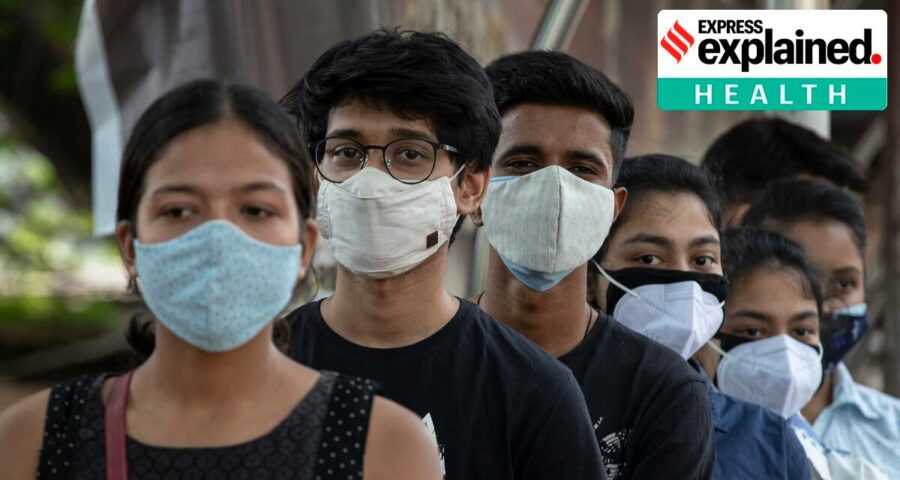The CDC guidelines do not change the situation in India, but it is possible that some vaccinated people get swayed by the US decision and abandon masks thinking they are now safe, and also not in a position to infect anyone else.
On May 13, the Centers of Disease Control and Prevention (CDC), the US equivalent of the Indian Council of Medical Research, issued an advisory that took many, including scientists, by surprise. The CDC said “fully vaccinated” people in the US no longer needed to wear masks. People are considered fully vaccinated two weeks after taking the complete dose of the vaccine.
The CDC said its new guidance was based on evidence from studies that showed very few people had been getting infected after taking the vaccines. Their ability to transmit the disease to others was even rarer. But not everyone is convinced. While health agencies around the world often take their cues from the CDC, the latest guidance has led to questions being raised.
Newsletter | Click to get the day’s best explainers in your inbox
For Americans only
Obviously, the CDC advisory is meant only for the American public, and that too with some conditions. For examples, teachers and students have been asked to continue to mask up in schools. Also, vaccinated people have been advised to wear masks in crowded situations, flights, or when visiting healthcare facilities.
The US has been witnessing a steady decline in new cases and deaths for the last few months, although about 30,000 new cases are still being detected and over 600 deaths being reported every day. Part of the reason could be the fairly high penetration of vaccines in the population. Until last week, more than 120 million people, or close to one third of the US population, had been vaccinated.
The US is using the vaccines developed by Pfizer-BioNTech and Moderna, and also the single-dose vaccine from Johnson & Johnson. Studies have shown very few cases of infection among those who have taken both doses of the first two vaccines or the single dose of J&J’s vaccine. Even then, there has been much scepticism around the CDC advisory, with scientists saying it would add to confusion besides being difficult to implement. After all, who would check whether an unmasked person has been vaccinated or not?
No bearing on India
The CDC guidelines do not change the situation in India, but it is possible that some vaccinated people get swayed by the US decision and abandon masks thinking they are now safe, and also not in a position to infect anyone else. That is why scientists and health experts in India have been expressing their disagreement with the CDC decision.
“I do not agree (with the CDC guidance). I do not think there is adequate data to take a decision like this. I would prefer to wait for some more time,” said Dr Shashank Joshi, expert member on Maharashtra’s state Covid-19 task force.
Besides, the situation in India is very different. The second wave is still raging, only a small proportion of the population has been vaccinated, and there have been fewer studies on the impact of vaccines on people’s susceptibility. The vaccines being used in India are different: those developed by AstraZeneca/Oxford University, and Bharat Biotech.
In addition, several variants of the virus are circulating in the population, and data on effectiveness of the existing vaccines against these mutants is still being collected. Preliminary findings do suggest that the dominant variant, B.1.617, gets neutralised by both Covaxin and Covishield, but these studies are still continuing. Also, newer variants are continuing to emerge. The B.1.617 variant itself has given rise to at least three significant sub-variants, against which very little data is available so far.
“There is plenty of data to suggest that vaccines (being used in India) is providing protection to the Indian population. They work against the new variants as well, but with reduced effectiveness. But the big question is, can we predict how effective the vaccines would be against future mutants? Dropping the masks, therefore, is not advisable at all in India,” said virologist Shahid Jameel.
“Shedding the masks could be seen as an incentive for people to get vaccinated, but it could also have the reverse effect. It can send the message that all is well. It can lead to vaccine hesitancy. In my view, the CDC decision is very premature. In India’s case, dropping the mask can have disastrous consequences,” he said.
Gautam Menon, professor of physics and biology at the Ashoka University, pointed out that not everyone even in the US was convinced. “There has been some pushback from scientists and epidemiologists on this advice. Vaccines certainly protect people from the infection, and especially from severe diseases and death. Recent studies have shown that these can reduce transmission by about 50%, both in the case of AstraZeneca and Bharat Biotech vaccines. If disease prevalence is low, then this is acceptable. But the kind of situation we are in right now, it could be very risky. Also, we don’t know whether this reduced transmissibility holds even in the case of new emerging variants. I would suggest that people in India continue to wear masks for the time being,” he said.
Former chief epidemiologist at the ICMR, Dr R R Gangakhedkar said the CDC advisory had been possible because the US was using different kinds of vaccines. “They are using mRNA vaccines which have a fairly high efficacy to reduce the risk of infection. According to some studies, mRNA vaccines do better against the variants as well. So, the decision to allow vaccinated people to drop their masks could be based on sound scientific evidence. But, if people become complacent, and don’t use masks even in poorly ventilated or crowded spaces, it could be fraught with danger and result in a re-emergence of the outbreak,” he said.
Source: Read Full Article


